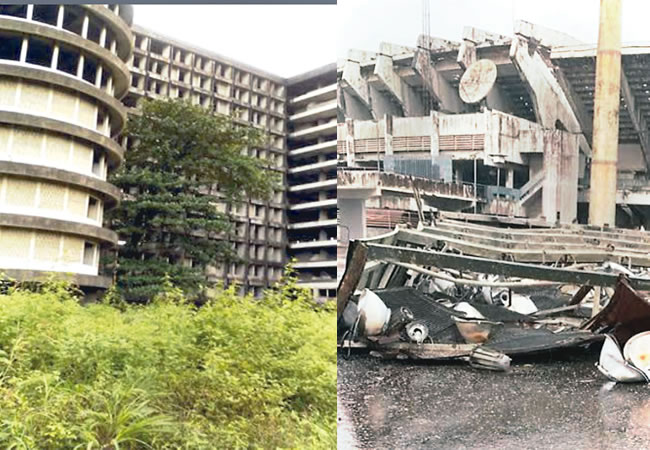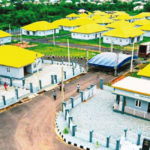The issue of abandoned Federal Government’s buildings was brought to the fore last week by experts following the collapse of one of the giant floodlights at the National Stadium in Surulere, Lagos. The experts are calling the Federal Government to do the needful to protect the national assets from further deterioration. DAYO AYEYEMI reports:
DISCUSSION about the abandoned Federal Government’s properties came to the fore last week following the collapse of one of the giant floodlights at the National Stadium in Surulere, Lagos became public.
The National Stadium, which was built 1972 in preparation for All African Games hosted by Nigeria in 1973, is currently in a poor condition due to long years of neglect and lack of maintenance.
People that saw the glory of the sports stadium some forty years ago have not stopped to condemn its current delapidated condition occasioned by long years of abandonment.
Report had it that the floodlight located on the K Entrance of the stadium, came down following the early morning rain, and just a few days that a seven-storey building caved in on Banana Island, Ikoyi, Lagos.
Since the incident at the National Stadium, built environment experts have continued to express their displeasure over the deteriorating nature of the old National Stadium and other abandoned properties in Lagos State.
Some of the abandoned properties include the old Federal Secretariat Complex,Ikoyi, former Navy Headquarter Building in Marina; former National Assembly Complex at TBS, Ministry of Communication building and former Supreme Court building, Ministry of Justice Annex building on Marina/Broad Street, Net Building and 18-storey NSITF building on Lagos-Badagry Road
Speaking to the Nigerian Tribune when interviewed, Principal partner, Stephen Jagun and Associates, Mr Stephen Jagun, who is also a certified facility manager, explained that the greatest asset of any nation is its real estate and landed properties.
He said “if any country refuses to maintain its real estate/properties, it means that such a country is destroying its assets.”
“Go to other countries and see what they are doing. It is because they maintain their assets and infrastructure, that is why they are enticing people to come. Even if those assets/properties are old, they ensure they are in good state.”
Registering his disapproval over the poor state of the abandoned federal government’s properties in Lagos, Jagun pointed out that most of the properties that are supposed to constitute national assets have deteriorated because of manyyears of abandonment and lack of maintenance.
“That’s why you see so many government’s facilities in bad shape, that any good investor should not have allowed,” he said.
Jagun, a former Chairman of the Nigerian Institution of Estate Surveyors and Valuers, Lagos Branch, said that the government has the responsibility to take up the assignment and do the needful.
“It is the duty of government to take up the assignment to do the needful in regards to the abandoned properties.”
Jagun blamed the collapse of the National Stadium’s floodlight on lack of preventive maintenance.
“The wind came and blew the iron members that have lost their strength. If somebody had been checking regularly and do the necessary maintenance, it would have been able to withstand the wind. But nobody took notice of this because to them it’s still working,” he said.
Looking at the possibility of revamping the abandoned properties, Jagun explained that despite the fact that some of the assets had seen deterioration, theycould be salvaged if government commences their maintenance now.
Jagun disclosed that the group of facility managers in the country has mapped out plans to engage the central government and its agencies on the abandoned national assets.
Another real estate expert,Mr Femi Oyedele, once told Nigerian Tribune that more than 50,000 abandoned public buildings littered Nigeria.
According to him, their market value was put at about N9.5 trillion with an average market value of N190 million.
“This evaluation and field survey was done in 2021 by the estate surveyors and valuers. They are mostly in Lagos, Abuja and Port Harcourt,” he said.
Commenting on the falling floodlight in BCPG’s platform, former President, Nigerian Institution of Structural Engineers, Mr Oreoluwa Fadayomi, corroborated Jagun, saying the collapse of the floodlight was due to lack of maintenance’s culture.
“What a price to pay for lacking maintenance culture,”he said.
Another professional,SegunAlawode, said that serious actions should be taken on the collapsed floodlight and other Federal Government’s properties in Lagos, most especially old Federal Secretariat, to prevent further deterioration and collapse.
Speaking with one of the veterans sport journalists, Kunle Salami, on the degenerated National Stadium in Surulere, he stated that no major maintenance was carried out on the facility 51 years after construction.
“The lifespan of an average stadium before renovation is 30 years. After 30years, the stadium is expected to undergo checks, renovation, and upgrading.
“For 51 years now, not a major maintenance work has been carried out on the stadium.We just continue to use it, relying on its old glory.”
Salami explained that the stadium had been abandoned for 18 years, adding that many things were left unattended to in terms of its maintenance.
He disclosed that the integrity test conducted by experts on the main structure of the stadium recently showed that 40 per cent of the area failed.
According to him, location facing the VIP post risked collapse, adding that the experts had disclosed that the solution was to pull down that section of the stadium that failed integrity test.
“But, where’s the money,” he said.
Before now, he said that over 120 illegal shops were demolished within the premises of the stadium, in addition to shanties built by some individuals while collecting rent.
He recalled how successive governments neglected the stadium to deteriorate and how former Minister of Sport, Solomon Dalung wanted to concession the facility to the Lago’s State Government.
He also explained the efforts being made by the current Minister of Sport, Muyiwa Dare.
According to him, the new minister, having discovered that the government alone could not fix the facility, had invited the private sector.
“That was how AdebutuKeshington was brought in. He was given 17 items to fix but due to funding issue, Keshington agreed to fix the grass, the scoreboard and the track. He has done those three things.
“The minister explained that the government planned for 10 investors, but only one stayed. After that six investors showed interest but shortly after that, Covid came, and that prevented other sponsors from coming in,” he said.
Salami said there was public outcry recently when the minister disclosed that Nigeria would need N21billion to fix the stadium.
According to Salami, renovation of stadium all over the does not come cheap, citing the example of Man City that is planning to spend $370million for the upgrade/ expansion of its stadium.
Based on the current efforts to salvage the facility, Salami stated that lately the swimming pool, tennis areas have been working, adding that the scoreboard and NIS building have been renovated.
“Government concessioned the place to someone who fixed those items,” he said
The sports journalist revealed that the entire electricity cable in the stadium (almond) had been stolen, making it difficult to activate the scoreboard due to lack of power supply.
“Money owning DisCos is running to N600 million, while that of water bill was N150million. The authority is considering alternative source of power like solar and wind,’ he said.
Professor of Building, University of Lagos, Prof. OlumideAfolarinAdenuga, explained that the economic loss of the National Stadium in Lagos between 2004 and 2018 was over N52.6billion due to neglect and lack of maintenance.
Adenuga added that other stadia especially those in Ibadan, Enugu, Bauchi, Kaduna and Abuja were also suffering major neglect and complete desertion, noting that all of them have become a huge economic waste.
Adenuga appealed to the government to take quick steps at reactivating these assets as well as other buildings that had been abandoned at different locations in the country.
He noted that rather than maintaining the existing facilities, government’s concern was to give more attention to new constructions, “with unfortunate result that buildings are left in waste, deteriorate and decay at an alarming rate.”
This unhealthy trend, Adenuga said needed to be reversed urgently, calling for a change of attitude in connection with abandoned buildings if national catastrophes and embarrassment to are to be averted.
“Proper management and maintenance of the landed property is as important as its actual construction since it is vital to the economic, historical, social and cultural development of the country,” he said.
READ ALSO FROM NIGERIAN TRIBUNE
WATCH TOP VIDEOS FROM NIGERIAN TRIBUNE TV
- Let’s Talk About SELF-AWARENESS
- Is Your Confidence Mistaken for Pride? Let’s talk about it
- Is Etiquette About Perfection…Or Just Not Being Rude?
- Top Psychologist Reveal 3 Signs You’re Struggling With Imposter Syndrome
- Do You Pick Up Work-Related Calls at Midnight or Never? Let’s Talk About Boundaries







